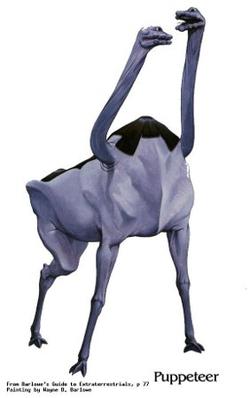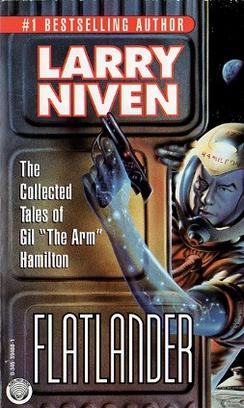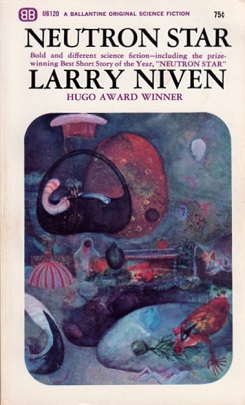Known Space is the fictional setting of about a dozen science fiction novels and several collections of short stories by American writer Larry Niven. It has also become a shared universe in the spin-off Man-Kzin Wars anthologies. The Internet Speculative Fiction Database (ISFDB) catalogs all works set in the fictional universe that includes Known Space under the series name Tales of Known Space, which was the title of a 1975 collection of Niven's short stories. The first-published work in the series, which was Niven's first published piece, was "The Coldest Place", in the December 1964 issue of If magazine, edited by Frederik Pohl. This was the first-published work in the 1975 collection.

Ringworld is a 1970 science fiction novel by Larry Niven, set in his Known Space universe and considered a classic of science fiction literature. Ringworld tells the story of Louis Wu and his companions on a mission to the Ringworld, a rotating wheel artificial world, an alien construct in space 186 million miles in diameter. Niven later added three sequel novels and then cowrote, with Edward M. Lerner, four prequels and a final sequel; the five latter novels constitute the Fleet of Worlds series. All the novels in the Ringworld series tie into numerous other books set in Known Space. Ringworld won the Nebula Award in 1970, as well as both the Hugo Award and Locus Award in 1971.

The Kzinti are a fictional, warlike, and bloodthirsty race of cat-like aliens in Larry Niven's Known Space series.

Pierson's Puppeteers, often known just as Puppeteers, are a fictional alien race from American author Larry Niven's Known Space books. The race first appeared in Niven’s novella Neutron Star.

Crashlander is a fix-up novel by American writer Larry Niven, published in 1994 (ISBN 978-0345381682) and set in his Known Space universe. It is also a term used in the Known Space universe, denoting a human born on the planet We Made It.
Louis Gridley Wu, a fictional character, is the protagonist in the Ringworld series of books, written by Larry Niven.
"Neutron Star" is an English language science fiction short story by American writer Larry Niven. It was originally published in the October 1966 issue of Worlds of If. It was later reprinted in the collection of the same name and Crashlander. The story is set in Niven's fictional Known Space universe. It is notable for including a neutron star before their existence was widely known.

The Man-Kzin Wars is a series of military science fiction anthologies and is the name of the first. The short stories detail the eponymous conflicts between mankind and the Kzinti, set in Larry Niven's Known Space universe. However, Niven himself has written only a small number of the stories; most were written by other science fiction writers, as Niven opened this part of the Known Space to collaboration in the form of a shared universe. The cover art for the books in the series is created by Stephen Hickman.

Flatlander (ISBN 0-345-39480-1) is a 1995 collection of stories by American writer Larry Niven, all set in Known Space. It is the definitive collection of all stories by Niven about ARM agent Gil Hamilton. Many of the stories revolve around the theme of involuntary organ transplantation.
"At the Core" is an English language science fiction short story by American writer Larry Niven, published in 1966. It is the second in the series of Known Space stories featuring crashlander Beowulf Shaeffer. The short story was originally published in Worlds of If, November 1966, and reprinted in Neutron Star (1968) and Crashlander (1994).
"Grendel" is an English language science fiction short story written in 1968 by Larry Niven. It is the fourth in the series of Known Space stories featuring crashlander Beowulf Shaeffer. The short story was originally published in Neutron Star (1968), and reprinted in Crashlander (1994). It has no connection to the creatures called Grendels in Niven's Heorot series.

"The Borderland of Sol" is a science fiction novelette by American writer Larry Niven. It is the fifth in the Known Space series of stories about crashlander Beowulf Shaeffer.
"Procrustes" is an English-language science fiction short story written in 1993 by Larry Niven. It is the sixth in the series of stories about crashlander Beowulf Shaeffer. The short story was originally published in Bridging the Galaxies (1993).
The planetary systems of stars other than the Sun and the Solar System are a staple element in many works of the science fiction genre.

"The Soft Weapon" is a science fiction short story by the American writer Larry Niven, set in his Known Space universe. It was first published in the February 1967 issue of If.

Juggler of Worlds (2008) is a science fiction novel by American writers Larry Niven and Edward M. Lerner, a sequel to their Fleet of Worlds.

Neutron Star is a collection of science fiction short stories by American writer Larry Niven, published in April 1968. The individual stories were published in If and Galaxy Science Fiction in 1966–1967, under Frederik Pohl as editor.
Evacuate Earth is a National Geographic Channel documentary that portrays the hypothetical scenario of humans evacuating the planet Earth before it is destroyed by a rogue neutron star. The documentary details the technical and social complications of building a generation ship to save humanity and other Earth organisms by relocating to a planet in another solar system.
This is a complete bibliography by American science fiction author Larry Niven:








